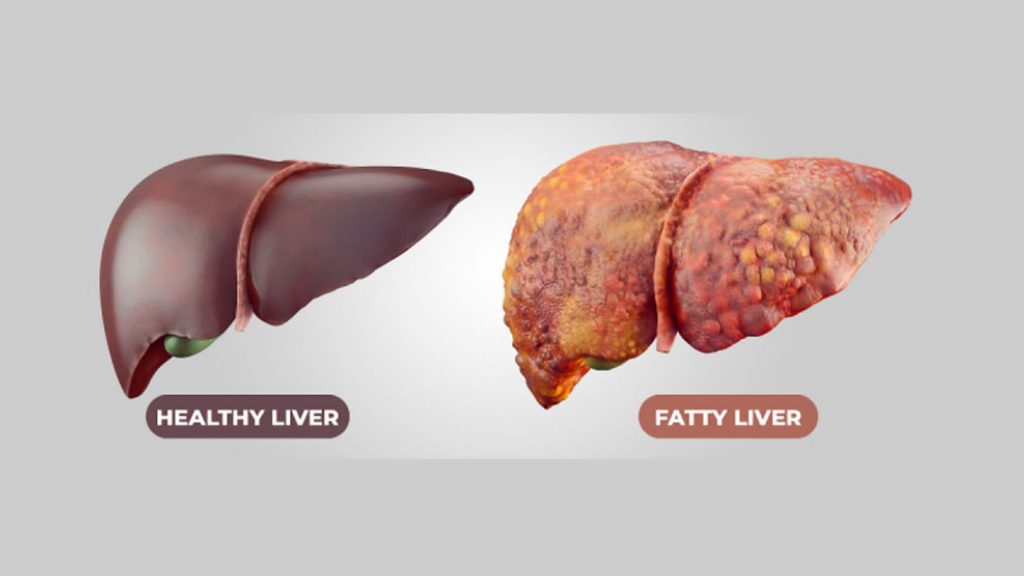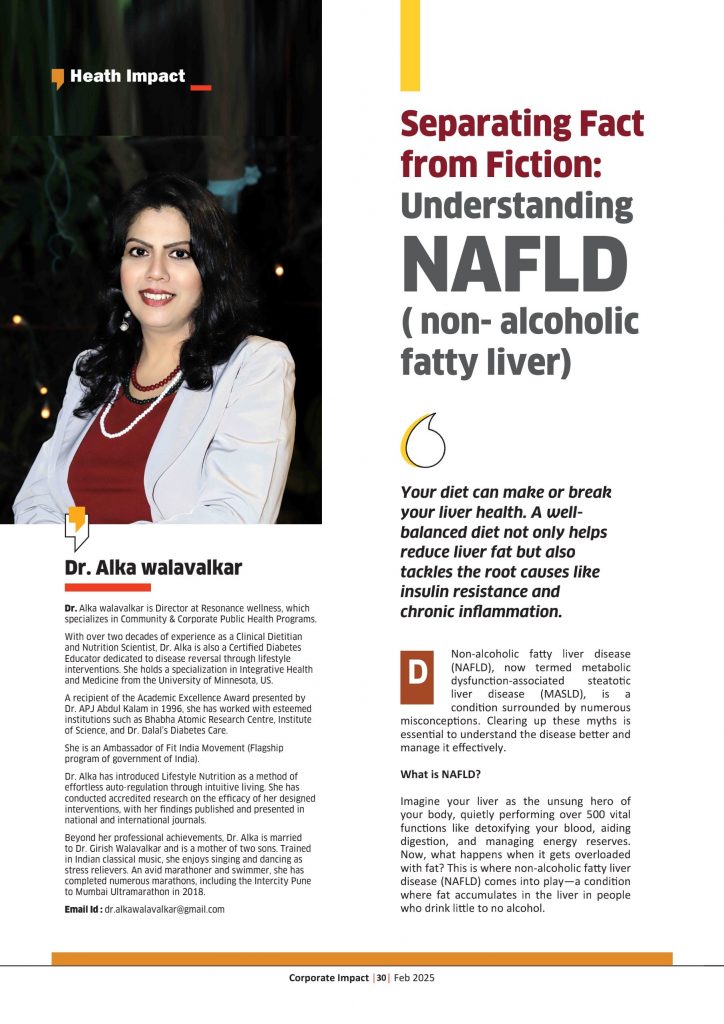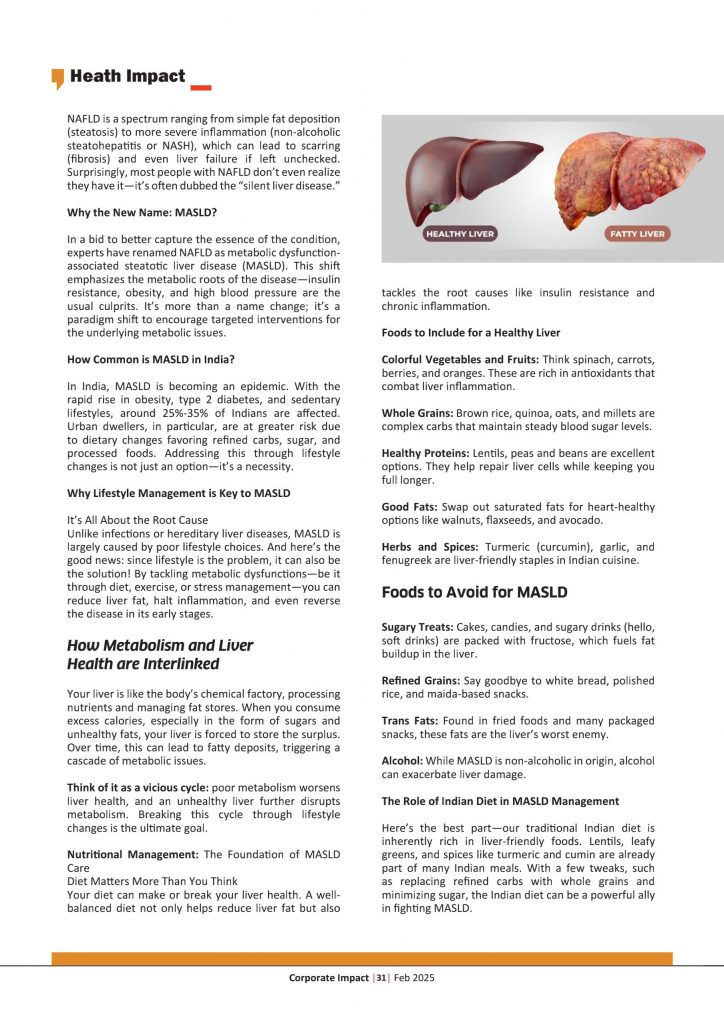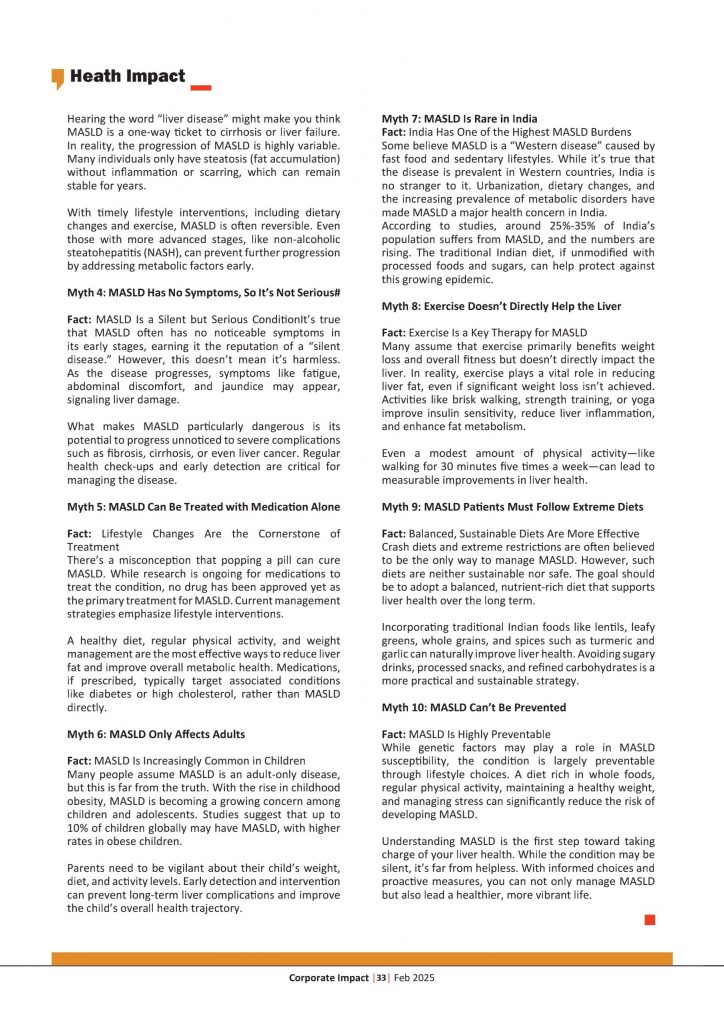Your diet can make or break your liver health. A well-balanced diet not only helps reduce liver fat but also tackles the root causes like insulin resistance and chronic inflammation.
Dr. Alka walavalkar
Dr. Alka walavalkar is Director at Resonance wellness, which specializes in Community & Corporate Public Health Programs.
With over two decades of experience as a Clinical Dietitian and Nutrition Scientist, Dr. Alka is also a Certified Diabetes Educator dedicated to disease reversal through lifestyle interventions. She holds a specialization in Integrative Health and Medicine from the University of Minnesota, US.
A recipient of the Academic Excellence Award presented by Dr. APJ Abdul Kalam in 1996, she has worked with esteemed institutions such as Bhabha Atomic Research Centre, Institute of Science, and Dr. Dalal’s Diabetes Care.
She is an Ambassador of Fit India Movement (Flagship
program of government of India).
Dr. Alka has introduced Lifestyle Nutrition as a method of effortless auto-regulation through intuitive living. She has conducted accredited research on the efficacy of her designed interventions, with her findings published and presented in national and international journals.
Beyond her professional achievements, Dr. Alka is married to Dr. Girish Walavalkar and is a mother of two sons. Trained in Indian classical music, she enjoys singing and dancing as stress relievers. An avid marathoner and swimmer, she has completed numerous marathons, including the Intercity Pune to Mumbai Ultramarathon in 2018.
Email Id : dr.alkawalavalkar@gmail.com
Non-alcoholic fatty liver disease (NAFLD), now termed metabolic dysfunction-associated steatotic liver disease (MASLD), is a condition surrounded by numerous misconceptions. Clearing up these myths is essential to understand the disease better and manage it effectively.

What is NAFLD?
Imagine your liver as the unsung hero of your body, quietly performing over 500 vital functions like detoxifying your blood, aiding digestion, and managing energy reserves. Now, what happens when it gets overloaded with fat? This is where non-alcoholic fatty liver disease (NAFLD) comes into play—a condition where fat accumulates in the liver in people who drink little to no alcohol.
NAFLD is a spectrum ranging from simple fat deposition (steatosis) to more severe inflammation (non-alcoholic steatohepatitis or NASH), which can lead to scarring (fibrosis) and even liver failure if left unchecked. Surprisingly, most people with NAFLD don’t even realize they have it—it’s often dubbed the “silent liver disease.”
Why the New Name: MASLD?
In a bid to better capture the essence of the condition, experts have renamed NAFLD as metabolic dysfunction-associated steatotic liver disease (MASLD). This shift emphasizes the metabolic roots of the disease—insulin resistance, obesity, and high blood pressure are the usual culprits. It’s more than a name change; it’s a paradigm shift to encourage targeted interventions for the underlying metabolic issues.
How Common is MASLD in India?
In India, MASLD is becoming an epidemic. With the rapid rise in obesity, type 2 diabetes, and sedentary lifestyles, around 25%-35% of Indians are affected. Urban dwellers, in particular, are at greater risk due to dietary changes favoring refined carbs, sugar, and processed foods. Addressing this through lifestyle changes is not just an option—it’s a necessity.
Why Lifestyle Management is Key to MASLD
It’s All About the Root Cause
Unlike infections or hereditary liver diseases, MASLD is largely caused by poor lifestyle choices. And here’s the good news: since lifestyle is the problem, it can also be the solution! By tackling metabolic dysfunctions—be it through diet, exercise, or stress management—you can reduce liver fat, halt inflammation, and even reverse the disease in its early stages.
How Metabolism and Liver
Health are Interlinked
Your liver is like the body’s chemical factory, processing nutrients and managing fat stores. When you consume excess calories, especially in the form of sugars and unhealthy fats, your liver is forced to store the surplus. Over time, this can lead to fatty deposits, triggering a cascade of metabolic issues.
Think of it as a vicious cycle: poor metabolism worsens liver health, and an unhealthy liver further disrupts metabolism. Breaking this cycle through lifestyle changes is the ultimate goal.
Nutritional Management: The Foundation of MASLD Care
Diet Matters More Than You Think
Your diet can make or break your liver health. A well-balanced diet not only helps reduce liver fat but also tackles the root causes like insulin resistance and chronic inflammation.
Foods to Include for a Healthy Liver
Colorful Vegetables and Fruits: Think spinach, carrots, berries, and oranges. These are rich in antioxidants that combat liver inflammation.
Whole Grains: Brown rice, quinoa, oats, and millets are complex carbs that maintain steady blood sugar levels.
Healthy Proteins: Lentils, peas and beans are excellent options. They help repair liver cells while keeping you full longer.
Good Fats: Swap out saturated fats for heart-healthy options like walnuts, flaxseeds, and avocado.
Herbs and Spices: Turmeric (curcumin), garlic, and fenugreek are liver-friendly staples in Indian cuisine.
Foods to Avoid for MASLD
Sugary Treats: Cakes, candies, and sugary drinks (hello, soft drinks) are packed with fructose, which fuels fat buildup in the liver.
Refined Grains: Say goodbye to white bread, polished rice, and maida-based snacks.
Trans Fats: Found in fried foods and many packaged snacks, these fats are the liver’s worst enemy.
Alcohol: While MASLD is non-alcoholic in origin, alcohol can exacerbate liver damage.
The Role of Indian Diet in MASLD Management
Here’s the best part—our traditional Indian diet is inherently rich in liver-friendly foods. Lentils, leafy greens, and spices like turmeric and cumin are already part of many Indian meals. With a few tweaks, such as replacing refined carbs with whole grains and minimizing sugar, the Indian diet can be a powerful ally in fighting MASLD.
Specific Nutritional Guidelines
Getting the Macronutrient Balance Right
Carbohydrates: Limit to 40-50% of daily calories. Switch to whole-grain rotis, bajra, jowar, and unpolished rice.
Proteins: Aim for 20-25% of your diet. Include legumes, peas, beans, paneer, tofu in your meals.
Fats: Focus on healthy fats from nuts and seeds, cow’s ghee (in moderation) while keeping total fat intake below 20% of calories.
The Power of Micronutrients
Vitamin E: Found in almonds, sunflower seeds, and spinach, it reduces liver inflammation.
Omega-3 Fatty Acids: Flaxseeds, chia seeds, walnuts can help regulate liver fat.
Vitamin D: Essential for liver health; get it from fortified foods or sunlight exposure.
Weight Management and Physical Activity
Why Exercise is Non-Negotiable
Exercise not only burns calories but also improves insulin sensitivity and reduces liver fat. Even 30 minutes a day can make a big difference.
MASLD-Friendly Exercises
Low-Impact Cardio: Walking, cycling, or swimming to boost metabolism without overexertion.
Strength Training: Helps build muscle, which enhances your body’s fat-burning capability.
Yoga: Poses like Cobra and Bow improve liver circulation.
Tips for Weight Loss
Practice portion control—use smaller plates if needed.
Avoid second helpings at meals.
Replace sugary chai with unsweetened herbal tea.
Beyond Diet and Exercise: Other Lifestyle Hacks
Sleep: The Unsung Hero
Did you know inadequate sleep can worsen insulin resistance? Aim for 7-8 hours of quality sleep to support liver recovery.
Stress Management
Chronic stress releases cortisol, a hormone linked to fat accumulation. Simple mindfulness exercises or hobbies can help reduce stress.
Overcoming Challenges
Cultural habits like heavy reliance on fried snacks or sugary desserts can make lifestyle changes daunting. Start small—swap out fried papads for roasted ones or replace sugary desserts with fruits like mango or papaya.

Prevention is Better Than Cure
Educating communities about MASLD, encouraging routine health screenings, and promoting fitness can help curb this epidemic.
Conclusion
MASLD may be silent, but it’s not undefeatable. By embracing a holistic approach that includes balanced nutrition, regular exercise, and mindful living, you can restore your liver’s health and vitality. Let’s make lifestyle our medicine.
Myths and Facts About NAFLD (MASLD)
Here’s a detailed look at some common myths and the facts that debunk them.
Myth 1: MASLD Only Affects Obese Individuals
Fact: MASLD Can Affect People of All Body Types
It’s a common belief that MASLD is only a concern for people who are overweight or obese. While obesity is a significant risk factor, lean individuals are not immune to this condition. Lean MASLD, often called “lean NAFLD,” is a recognized phenomenon, especially in populations like India, where a genetic predisposition to metabolic disorders exists.
Thin individuals with poor diets, sedentary lifestyles, or insulin resistance can develop MASLD. Factors like visceral fat (fat stored around organs), genetic susceptibility, and even excessive sugar intake in normal-weight individuals play a crucial role in its onset.
Myth 2: MASLD Is Caused by Alcohol Consumption
Fact: MASLD Is Unrelated to Alcohol
This myth stems from the confusion surrounding the term “fatty liver.” While excessive alcohol consumption can cause alcoholic fatty liver disease (AFLD), MASLD is specifically defined as fat accumulation in the liver in people who drink little to no alcohol.
MASLD is primarily linked to metabolic dysfunctions such as insulin resistance, obesity, and diabetes. It’s essential to separate the two conditions to avoid unnecessary stigmatization of MASLD patients.
Myth 3: MASLD Always Leads to Severe Liver Disease
Fact: MASLD Progression Can Be Prevented and Even Reversed
Hearing the word “liver disease” might make you think MASLD is a one-way ticket to cirrhosis or liver failure. In reality, the progression of MASLD is highly variable. Many individuals only have steatosis (fat accumulation) without inflammation or scarring, which can remain stable for years.
With timely lifestyle interventions, including dietary changes and exercise, MASLD is often reversible. Even those with more advanced stages, like non-alcoholic steatohepatitis (NASH), can prevent further progression by addressing metabolic factors early.
Myth 4: MASLD Has No Symptoms, So It’s Not Serious#
Fact: MASLD Is a Silent but Serious ConditionIt’s true that MASLD often has no noticeable symptoms in its early stages, earning it the reputation of a “silent disease.” However, this doesn’t mean it’s harmless. As the disease progresses, symptoms like fatigue, abdominal discomfort, and jaundice may appear, signaling liver damage.
What makes MASLD particularly dangerous is its potential to progress unnoticed to severe complications such as fibrosis, cirrhosis, or even liver cancer. Regular health check-ups and early detection are critical for managing the disease.
Myth 5: MASLD Can Be Treated with Medication Alone
Fact: Lifestyle Changes Are the Cornerstone of Treatment
There’s a misconception that popping a pill can cure MASLD. While research is ongoing for medications to treat the condition, no drug has been approved yet as the primary treatment for MASLD. Current management strategies emphasize lifestyle interventions.
A healthy diet, regular physical activity, and weight management are the most effective ways to reduce liver fat and improve overall metabolic health. Medications, if prescribed, typically target associated conditions like diabetes or high cholesterol, rather than MASLD directly.
Myth 6: MASLD Only Affects Adults
Fact: MASLD Is Increasingly Common in Children
Many people assume MASLD is an adult-only disease, but this is far from the truth. With the rise in childhood obesity, MASLD is becoming a growing concern among children and adolescents. Studies suggest that up to 10% of children globally may have MASLD, with higher rates in obese children.
Parents need to be vigilant about their child’s weight, diet, and activity levels. Early detection and intervention can prevent long-term liver complications and improve the child’s overall health trajectory.
Myth 7: MASLD Is Rare in India
Fact: India Has One of the Highest MASLD Burdens
Some believe MASLD is a “Western disease” caused by fast food and sedentary lifestyles. While it’s true that the disease is prevalent in Western countries, India is no stranger to it. Urbanization, dietary changes, and the increasing prevalence of metabolic disorders have made MASLD a major health concern in India.
According to studies, around 25%-35% of India’s population suffers from MASLD, and the numbers are rising. The traditional Indian diet, if unmodified with processed foods and sugars, can help protect against this growing epidemic.
Myth 8: Exercise Doesn’t Directly Help the Liver
Fact: Exercise Is a Key Therapy for MASLD
Many assume that exercise primarily benefits weight loss and overall fitness but doesn’t directly impact the liver. In reality, exercise plays a vital role in reducing liver fat, even if significant weight loss isn’t achieved. Activities like brisk walking, strength training, or yoga improve insulin sensitivity, reduce liver inflammation, and enhance fat metabolism.
Even a modest amount of physical activity—like walking for 30 minutes five times a week—can lead to measurable improvements in liver health.
Myth 9: MASLD Patients Must Follow Extreme Diets
Fact: Balanced, Sustainable Diets Are More Effective
Crash diets and extreme restrictions are often believed to be the only way to manage MASLD. However, such diets are neither sustainable nor safe. The goal should be to adopt a balanced, nutrient-rich diet that supports liver health over the long term.
Incorporating traditional Indian foods like lentils, leafy greens, whole grains, and spices such as turmeric and garlic can naturally improve liver health. Avoiding sugary drinks, processed snacks, and refined carbohydrates is a more practical and sustainable strategy.
Myth 10: MASLD Can’t Be Prevented
Fact: MASLD Is Highly Preventable
While genetic factors may play a role in MASLD susceptibility, the condition is largely preventable through lifestyle choices. A diet rich in whole foods, regular physical activity, maintaining a healthy weight, and managing stress can significantly reduce the risk of developing MASLD.
Understanding MASLD is the first step toward taking charge of your liver health. While the condition may be silent, it’s far from helpless. With informed choices and proactive measures, you can not only manage MASLD but also lead a healthier, more vibrant life.
















